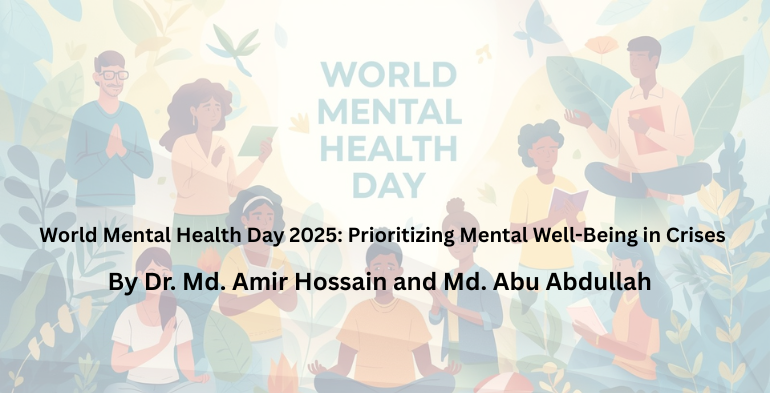
By Dr. Md. Amir Hossain and Md. Abu Abdullah: World Mental Health (WMH) Day, observed annually on October 10 since 1992, is a global platform to raise awareness about mental health, reduce stigma, and advocate for better mental health services. The 2025 theme, “Mental Health in Humanitarian Emergencies,” highlights the urgent need to address mental well-being during crises like natural disasters, conflicts, and public health emergencies. For Bangladesh, a nation prone to floods, cyclones, and the ongoing Rohingya refugee crisis, this theme resonates deeply, as mental health support often remains neglected despite its critical importance.
Humanitarian emergencies trigger significant emotional distress. Globally, one in five people in conflict-affected areas experiences mental health issues. In Bangladesh, events like Cyclone Amphan and the refugee crisis have intensified the psychological toll on communities. Feelings of fear, anxiety, or sadness during such crises are normal, but without timely intervention, these can escalate into long-term conditions like depression, anxiety disorders, or post-traumatic stress disorder (PTSD), hindering personal and societal recovery.
Mental disorders, which affect mood, thinking, and behavior, disrupt daily life, families, and communities. Common conditions include anxiety, depression, and schizophrenia, with one in eight people worldwide experiencing symptoms. Signs include extreme mood swings, social withdrawal, excessive fear, confusion, changes in eating habits, paraphilia (atypical sexual arousal), suicidal tendencies, and intense anger or hostility. Risk factors range from genetics and alcohol addiction to childhood trauma, chronic illnesses (e.g., diabetes, hypertension, cancer), and traumatic brain injuries.Diagnosis typically involves patient interviews and observation, sometimes supplemented by brain imaging like MRI. Family members play a crucial role in identifying symptoms. Treatment options include psychotherapy, neurotherapy, and, in some cases, medication. While mental disorders are not entirely preventable, regular psychiatric consultations, attentive care, and monitoring for symptom relapse can aid recovery and rehabilitation.
Dr. Tonmoy Prokash Biswas, former Director of Pabna Mental Hospital, notes that Bangladesh has around 200 practicing psychiatrists, a number insufficient for its population. However, growing awareness is encouraging more people to seek psychiatric care directly. Despite this progress, challenges like stigma and limited access to services persist, particularly in rural areas and during crises.Emerging issues, such as suicides following Secondary and Higher Secondary exam results or among farmers burdened by debt, highlight the need for urgent action.
Workplaces, especially those involved in disaster response, must prioritize mental health by fostering supportive environments, promoting work-life balance, and offering wellness programs like stress management workshops or exercise sessions. Such initiatives reduce absenteeism and boost morale, as seen in organizations with active wellness programs.Humanitarian workers, firefighters, and civil defense personnel, who are often on the frontlines of crises, face immense stress and sometimes personal loss. Organizations must provide rest, peer support, supervision, and workplace mental health programs to ensure their well-being and effectiveness.
Individuals can take proactive measures to protect their mental health during crises: Physical Activity,Walking, jogging, or yoga can reduce anxiety and depression. Balanced Diet: Consuming fruits, vegetables, and staying hydrated supports mental clarity, while avoiding sugary or processed foods maintains energy levels.
Social Connections: Spending time with family, friends, or community groups combats loneliness. Volunteering, such as aiding disaster-affected communities, fosters purpose and reduces depression. Open Conversations: Breaking the stigma around mental health requires open discussions. Educating communities about conditions like anxiety and depression can build empathy and support for those affected.
Prioritizing mental health during emergencies saves lives and empowers communities to heal and rebuild. This demands coordinated efforts from the government, healthcare providers, schools, and community organizations to ensure vulnerable groups, including disaster survivors and refugees, have access to psychosocial support. Key steps include: Integrating mental health services into disaster response frameworks. Training healthcare workers in psychological first aid. Expanding community-based mental health interventions. Raising public awareness to reduce stigma.
By investing in these measures, Bangladesh can build a resilient society where mental health is valued and accessible to all, especially during crises. Let us unite to create a nation that not only survives adversity but emerges stronger, with mental well-being at its core.
Dr. Md. Amir Hossain, MBBS, MPH, CCD, and Md. Abu Abdullah are former Additional Secretaries to the Government of Bangladesh.
























